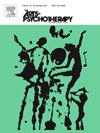Combining music and dance movement therapy for people with dementia living in the community: A mixed methods feasibility study
IF 1.5
3区 心理学
Q3 PSYCHOLOGY, CLINICAL
引用次数: 0
Abstract
Dementia is affecting an increasing number of people world-wide and presents a need to find more evidence-based therapies that can improve quality of life and care. Music therapy and dance movement therapy are two forms of arts therapies that share an active, embodied and improvisatory approach, however, maximising the benefits of combining music and dance movement therapy has not been researched with this population. In this feasibility study a convergent mixed methods design was used to evaluate the feasibility of using an intervention that combined music and dance movement therapy drawing on a systematic literature review. A dance movement therapist and a music therapist ran two session blocks involving eight participants in total. The Cornell Scale for Depression in Dementia was used at three assessment points (baseline, 5 weeks and 10 weeks) indicating an overall reduction in scores. Qualitative methods included multiple forms of data (video, reflective tool, journal) and focused on significant moments of connection between thoughts, feelings and physical sensations. It generated three main themes in the therapeutic process: making connections, acknowledging grief and loss, and growth and empowerment. This study contributes original knowledge to arts therapies research in the development of a research-based treatment approach involving a collaborative model of practice, an exploration of new arts-based data collection tools and testing this intervention in a community setting.
将音乐和舞蹈动作疗法结合起来,用于社区痴呆症患者:混合方法可行性研究
全世界越来越多的人受到痴呆症的影响,因此需要找到更多的循证疗法来提高生活质量和护理水平。音乐疗法和舞蹈运动疗法是艺术疗法的两种形式,它们都采用积极、具象和即兴的方法,但是,如何最大限度地发挥音乐疗法和舞蹈运动疗法的优势,还没有针对这类人群进行过研究。在这项可行性研究中,我们采用了聚合混合方法设计,以系统性文献综述为基础,评估使用音乐与舞蹈运动疗法相结合的干预措施的可行性。一名舞蹈运动治疗师和一名音乐治疗师共进行了两个疗程,共有八名参与者参与。在三个评估点(基线、5 周和 10 周)使用了康奈尔痴呆抑郁量表,结果显示总体得分有所下降。定性方法包括多种形式的数据(视频、反思工具、日记),重点关注思想、情感和身体感觉之间的重要联系。它在治疗过程中产生了三大主题:建立联系、承认悲伤和损失以及成长和赋权。这项研究为艺术疗法研究贡献了原创性知识,它开发了一种基于研究的治疗方法,涉及合作实践模式、探索新的基于艺术的数据收集工具以及在社区环境中测试这种干预措施。
本文章由计算机程序翻译,如有差异,请以英文原文为准。
求助全文
约1分钟内获得全文
求助全文
来源期刊

Arts in Psychotherapy
Multiple-
CiteScore
3.20
自引率
11.10%
发文量
66
期刊介绍:
The Arts in Psychotherapy is a dynamic, contemporary journal publishing evidence-based research, expert opinion, theoretical positions, and case material on a wide range of topics intersecting the fields of mental health and creative arts therapies. It is an international peer-reviewed journal publishing 5 issues annually. Papers are welcomed from researchers and practitioners in the fields of art, dance/movement, drama, music, and poetry psychotherapy, as well as expressive and creative arts therapy, neuroscience, psychiatry, education, allied health, and psychology that aim to engage high level theoretical concepts with the rigor of professional practice. The journal welcomes contributions that present new and emergent knowledge about the role of the arts in healthcare, and engage a critical discourse relevant to an international readership that can inform the development of new services and the refinement of existing policies and practices. There is no restriction on research methods and review papers are welcome. From time to time the journal publishes special issues on topics warranting a distinctive focus relevant to the stated goals and scope of the publication.
 求助内容:
求助内容: 应助结果提醒方式:
应助结果提醒方式:


